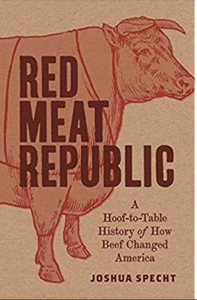
How hamburgers changed America


America is continent populated by migrants who either displaced or killed the indigenous people and it is interesting historians tell the story of America through a particular movement or group.
Joshua Specht examine the industries that helped make America rich and prosperous as well as environmental and political pattern have come back to bite America today.
In the 19th and 20th century shift that transformed beef from a special occasion treat to an everyday staple food and the revolutionised American culture, politics and the physical landscape.
What inspired westward movement of ambitious and adventurous people in search of new opportunities and the rise of powerful companies in the late 19th century, Standard Oil, Gulf and others that would become America’s oil majors, railroads and meat packing oligopoly that included Armour and Swift.
There was also anger over outsized influence of few business sectors – first banking after the financial crisis, now Silicon Valley.
Joshua Specht’s examination of the Cattle Kingdom shows how it helped reshape the midwest and south-west as native Americans were driven of prime range land and boom town rose to serve the migrating herds and then fell as railroads took over an increasing part of the transport network.
He follows the industry to great Chicago stockyards and to the East Coast small time butchers who were being squeezed out by the four big meatpacking companies.
“The cattle beef complex was national in scale and revolutionary in effect”. revealing how the shift tapped American ingenuity with the invention of refrigerated railcars and mass production lines in the slaughterhouse and also led to expansion of federal government power, with the creation of national meat inspectors. One of the Federal Trade Commission’s first ever antitrust investigations looked into the “unusually large margins” between the price of beef cattle and the selling price of the fresh meat. Meat packers exploited unskilled labour, bankrupted local butchers and meatpackers were able to beat back on most regulations through extensive lobbying that highlighted benefits of cheap meat. By touting low consumer prices and popular products, the four big slaughterhouse companies distracted from their excessive corporate power and other social harms similar to the big internet companies are seeking to do today.
The oil and beef industries were both critical to American lifestyles and the country’s view of itself as a land of plenty and opportunity.
American big companies have a way of adapting and thriving amid misfortune.
There’s an old army joke, why young captain, like all ambitious men, want a porterhouse steak. But his butcher is all out as apparently “all the Porterhouse goes to Colonel so-and-so. The Sirloin is reserved for Lieutenant Colonel this-or-that , all but the first cut, that goes to Major Somebody-or-other”.All that is left for the Captain is a round steak, a staple of the working poor. The young officer complains, “ I have been buying beefsteak by rank all my life and I am tired of it”.
Red Meat Republic: A Hoof-to-Table History of How Beef Changed America by Joshua Specht, Princeton $24.95/ £19.95, 344 pages.
